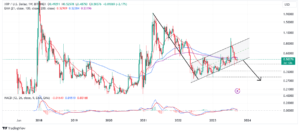[ad_1]
According to this banking insider, the governments have all of it incorrect. Bitcoin is without doubt one of the least personal property on the market, and they need to change insurance policies for the pendulum to swing the opposite approach. In the banking insider’s opinion, as an alternative of defending them, the governments have been harming their residents with the present draconian measures. That sounds handy for bitcoiners, certain, however this banking insider feels like the actual deal.
He or she, on a situation of anonymity, wrote an essay for The Bitcoin Policy Institute. It begins with, “Financial privacy – and, more specifically, the requirement to obtain informed consent prior to the collection and use of another’s personal financial information – is fundamental to individual freedom.” From there, it goes to Mordor and again. Is the banking insider on to one thing? Or is the banking insider simply toeing the bitcoiners’ social gathering line? Let’s look at what she or he stated and discover out.
But first, we shouldn’t separate this paragraph from the opening traces. It accompanies and enhances them.
“Due to the dual threats of exponentially increasing cybercrime and increased government surveillance and scrutiny of financial transactions, individual financial privacy is and has been under attack on multiple fronts, and the true costs are starting to manifest in noticeable ways.”
This is a vital topic and the world ought to completely focus on it ASAP. This banking insider is doing the governments a favor by explaining to them how privateness works in bitcoin. The essay additionally reads like a preemptive strike towards attainable Tornado Cash-like sanctions towards the bitcoin community.
About The Author/ The Banking Insider
Normally, we wouldn’t disrupt the circulate of the article with writer information, however this time it’s vital. If the readers don’t consider within the banking insider, they received’t take his phrases of knowledge significantly. This individual is aware of what’s up.
“The author is choosing to stay anonymous to protect their identity and the company they work for. They have worked at multiple publicly traded financial institutions in the fraud prevention and mitigation space; from ground-level tactics to enterprise strategy and policy.”
They additionally labored in “identity verification” and are concerned in KYC and AML “compliance and reporting.” The banking insider at the moment works at a financial institution “to prevent fraud and comply with existing regulatory guidelines around customer identity.” Their warning for governments and residents alike is as chilling as it’s wanted.
“As someone who has seen identity theft upend the lives of countless victims, I know how important financial privacy is to protect consumers from scammers and the criminal networks that have proliferated over the last 15 years. It’s estimated that global fraud losses equate to 6.4% of global GDP, coming in at a staggering $5.38 trillion dollars in 2021. Experts cite protecting and securing personal financial information as one of the most important actions a person can take to mitigate these threats.”
And since we’re giving credit score the place its due, The Bitcoin Policy Institute defines itself as “a nonpartisan, nonprofit organization researching the policy and societal implications of Bitcoin and emerging monetary networks.”

BTC worth chart for 09/22/2022 on FX | Source: BTC/USD on TradingView.com
The Banking Insider On Privacy
According to the banking insider, “cash provides the highest-level privacy.” In the second place, we’ve got bank card corporations or banks, in different phrases, “third parties to conduct transactions on our behalf.” Using these, there’s “ a relatively high level of privacy” as a result of these corporations are “legally bound not to disclose our transaction information from others without our consent.”
You know who’s within the third place, “because Bitcoin is an open, public ledger, a user’s transaction history is available publicly to everyone.” The transparency of the bitcoin community implies that “anyone can see all the transactions in the past that are linked to the holdings in that wallet address – and in many cases, how much Bitcoin is in the wallet!”
That leads us to prevention. Just in case lawmakers are eager about directing a Tornado Cash-like assault on bitcoin:
“Bitcoin users who don’t want to share their entire transaction history or net worth when transacting with a merchant can use collaborative transaction tools to bring their financial privacy up to par with their other payment methods. These tools provide a similar service to what Visa provides its users today; they shield transactional details from both the counterparty to the transaction and from external observers.”
It’s not solely that collaborative transactions usually are not against the law. They’re completely obligatory for the system to supply privateness.
“These collaborative transaction tools demonstrate a clear benefit to end-users but are viewed suspiciously by policymakers and the financial institutions that are enabling the crypto exchanges and services, as these tools are also conceptually attractive for criminals who want to try to “break the chain” of visibility into the sources of their funds.”
Conclusions
In the tip, the banking insider is just saying that bitcoin customers deserve “the same level of financial privacy that Americans are legally entitled to for day-to-day transactions – regardless of how those individuals choose to pay or be paid.” And that the system is completely different sufficient to deserve a brand new algorithm. And that this isn’t a trivial matter.
“As Bitcoin users grow via regulated exchanges, lawmakers must ensure that their financial privacy is protected at the same level as all other regulated payment rails. If this isn’t addressed soon, the global threat that fraud poses today will only accelerate.”
Remember, “experts cite protecting and securing personal financial information as one of the most important actions a person can take to mitigate” privateness threats.
Featured Image by Jason Dent on Unsplash | Charts by TradingView

[ad_2]
Source link



